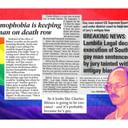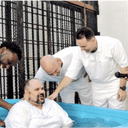A UMNS Commentary
By John C. Goodwin*
March 28, 2008
“You have women clergy in The United Methodist Church?” The question was posed to me several years ago by Sister Dorothy Briggs, a new friend in the movement to abolish the death penalty.
Acknowledging that she knew very little about the Protestant church, she was delighted to learn that most Protestant churches ordain women. She was especially pleased to learn that The United Methodist Church has female bishops.
I went on to tell her about the spirit of ’56.
In 1956, the Methodist Church gave women full clergy rights. The 1956 General Conference also added opposition to the death penalty to the church’s Book of Discipline. There had been church editorials against capital punishment going back at least to the trial and executions of Nicola Sacco and Bartolomeo Vanzetti in the 1920s, but it wasn’t until 1956 that opposition to the death penalty became church policy. Movement in New Jersey
On Dec. 17, 2007, New Jersey Gov. Jon Corzine signed a bill abolishing the death penalty, making New Jersey the first state to abolish the practice since capital punishment was reinstated in 1976 after a U.S. Supreme Court-ordered hiatus. According to the Death Penalty Information Center, 36 states now allow capital punishment, while 14 others, plus the District of Columbia, do not.
Why New Jersey? Corzine had stated that he has been against capital punishment for his entire political life. But governors can’t change state laws without the support of a majority of the state’s legislators. Legislators need to know the views of their constituents. An important role for the church is to educate people on moral issues and to encourage them to express their views, and the position of the church, to their legislators.
Many church members are unaware that The United Methodist Church opposes capital punishment, and certainly there are United Methodists on both sides of this issue.
In 1998, the New Jersey Council of Churches called together 10 Protestant leaders to discuss the death penalty and possible responses. Out of that meeting came a pastoral letter in which the denominational leaders explained that in their view the death penalty was incompatible with Christian teachings, and they pledged to educate their members.
Former United Methodist Bishop Alfred Johnson, a signer of the pastoral letter, established the New Jersey area Task Force to Abolish the Death Penalty. I became the co-convener of the task force, working first with the Rev. Bryan Bass-Riley and then with the Rev. William Greene. Coordinating closely with the conference board of church and society, we developed educational and worship materials, sponsored a public event with guest speakers, led workshops in churches and wrote resolutions which, after passage at each annual conference, were mailed by the conference secretary to all 120 state legislators and the governor.
The task force also aligned itself with a newly formed secular organization – – New Jerseyans for a Death Penalty Moratorium – – which later became New Jerseyans for Alternatives to the Death Penalty. I joined their executive committee as did the Rev. Karl Kraft, a United Methodist pastor, and our bishops have served on the advisory committee.
Laying the groundwork
Without this organization — and the faith and secular groups they enlisted in the cause of abolition — New Jersey would not have made death penalty history.
They visited legislators, organized public meetings and letter-writing campaigns, often in churches, and developed a database of more than 10,000 sympathetic individuals. They brought in innocent exonerated Death Row inmates to speak and to testify before governmental committees. Several surviving family members of violent crimes actively proved that survivors don’t always demand executions to bring about “closure.“
Sister Briggs, who died in 2006 at the age of 83, organized a program that encourages people to ring their church bells or put up banners on those days when someone, anywhere in the country, is executed. My church displays such a banner, which is often seen by our pro-death penalty state senator.
I am convinced that the United States will join Western Europe and most of the democracies of the world in giving up the death penalty. But here, for a time at least, the work must be done on a state-by-state basis. This is how The United Methodist Church can help to make a difference.
*Goodwin, a photojournalist, is a member of the United Methodist Church at Demarest, N.J.
News media contact: Linda Bloom, New York, (646) 369‑3759 or [email protected].



